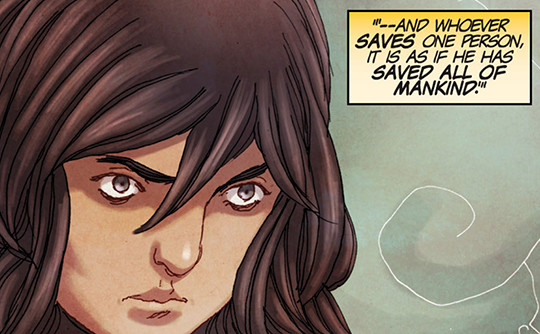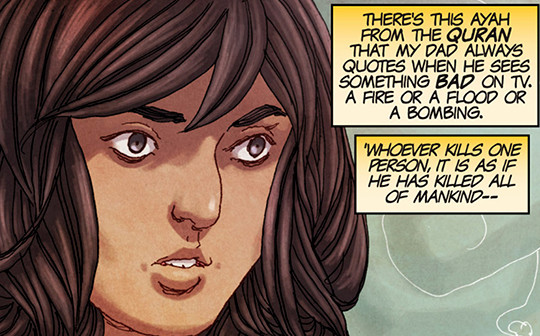Since she debuted in 2014, Kamala Khan has been explicitly Muslim, and one who incorporates Islam into her heroism. Right after she underwent Terrigenesis and received her polymorphic powers in her second-ever issue, she recites an ayah from the Quran that her dad always quotes whenever he sees terrible events on the news. “Whoever kills one person, it is as if he has killed all of mankind — and whoever saves one person, it is as if he has saved all of mankind.” Even though she has no idea what her new powers even are, this inspires her to save someone with them, her first act of superheroism.
Her comics frequently show the role of Islam in her life, through her parents and brother, her masjid community, her best friend Nakia. This kind of direct Islamic inspiration, combined with her love for her Jersey City and Muslim communities, makes Kamala stand out as a proud Muslim who actively incorporates her faith into her heroism. While her new MCU show does convey the importance of Islam in her life generally, it doesn’t quite meet the bar set by her first comics — at least not yet.
Image: G. Willow Wilson, Adrian Alphona/Marvel

Image: G. Willow Wilson, Adrian Alphona/Marvel
The first season, which just wrapped on Disney Plus after six episodes, does indeed show a few instances that resemble her Islamic inspiration to heroism. Islam is clearly an important daily presence in Kamala’s (Iman Vellani) life. With her brother, Aamir (Saagar Shaikh), reciting Quranic verses, Kamala praying at the masjid with Nakia (Yasmeen Fletcher) or celebrating Eid, and a beautiful Muslim wedding where the words “Allahu akbar” were said in a wonderfully joyous tone, the Muslim joy shone throughout the series. But the show seems tentative to get more direct than that, namely with Sheikh Abdullah (Laith Nakli) and her father, Yusuf (Mohan Kapur), who vocalize Islamic teachings to her, although the show doesn’t explicitly say as much. When her father says the ayah at the end of the season, it’s not made clear this is an ayah or even Islamic.
By contrast, her Islamic inspiration in the comics is very clear, going all the way to her iconic catchphrase, written by G. Willow Wilson: “Good is not a thing you are, it’s a thing you do,” which resembles Quranic verses pertaining to doing good deeds. As Surah Al-Maidah 5: Ayah 9 says, “Allah has promised those who believe and do ‘His’ forgiveness and a great reward,” inspiring Muslims to actively practice good deeds for humanity.
In the show, Kamala’s inspirations from Islam are less explicit, and more about tying her to her broader community and cultural identity. We have another sweet scene between Kamala and Sheikh Abdullah in episode 3 during the pre-wedding gathering at the Khan house. As Kamala expresses doubt about the new hero (herself) being a net good for their Muslim community, based on the worries she heard expressed from Nakia and others about making them more of a target, Sheikh Abdullah (who probably has inferred she is this new hero) gently reminds her that “Night Light” still saved a young boy from falling from the minaret. Kamala then asks how the new hero can convince everyone that she’s good, and he simply responds with Ms. Marvel’s iconic catchphrase. It’s key, but it’s brief — especially considering how he plays a more active role in her heroic tutelage in the comics, even if he doesn’t explicitly know she’s Ms. Marvel.
Sheikh Abdullah is a consistently kind presence in Kamala’s life in the comics, one who helps guide her, Nakia, and others through life and its tribulations as a mentor who can naturally relate to the younger members of his congregation. In that, he stands as a great example of a Muslim religious leader in Western media, and shows how Islam is a genuine guiding force of morality and determination to do good for Muslims worldwide. When her father believes she is acting strange for going out late at night, he asks her to speak with the Sheikh, and the burgeoning young hero finds her religious leader more understanding than she expected. In fact, Sheikh Abdullah instills more confidence in Kamala to pursue heroism, and to foster the best qualities about herself that he knows she has.
It’s through these teachings we come to understand Kamala Khan as not just a force for good, but a Muslim one through and through. Other media haven’t quite explored this in depth, but the comics medium gives the creators the groundwork to do so. Even while she’s not as vocally religious as, say, Aamir, who constantly recites surahs and has the express aim of becoming a religious leader in their community, she carries her religion in her heroism.
It is a core part of her call to action as she consistently perseveres against the villains she faces, protecting her Jersey City community from gentrifiers and corrupt capitalists who seek to exploit it. Her home is a loving one, and her parents have clearly modeled how to be a strong, capable young hero. Along with her best friend, Nakia, Kamala’s love of her broader community has a core root in her Muslim community, which is simply a part of Jersey City along with everyone else. Her comics consistently touch on this and the unity that Ms. Marvel is able to build.
It’s unfortunate that we don’t have this as much in Ms. Marvel, which had to fit so much into only six episodes. While the show still did demonstrate Islam as a guiding force for Kamala’s heroism, it was relatively succinct compared to its comics source. The good news, however, is that Kamala is still only at the start of her heroic journey in the MCU. Hopefully, if Ms. Marvel does get a season 2, it can explore much more of how Kamala engages with the teachings of her faith, specify Quranic verses that teach and guide her, show the advice she gets from Sheikh Abdullah and devout members of their Muslim community, and overall just show even more to both Muslim and non-Muslim audiences that spiritual guidance from non-Christian faiths and practices are also deserving of widespread representation in media. Western media has portrayed Muslims as villainous or morally dubious for far too long, and it’s about time that we have far more proudly Muslim heroes just like Kamala Khan.

